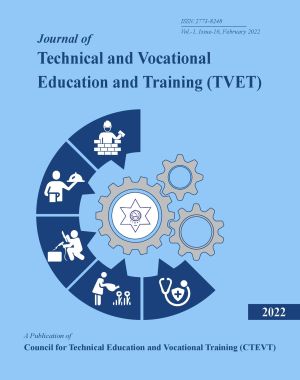Experience of Violence due to COVID-19 among Returnee Migrants of Far-Western Province of Nepal
DOI:
https://doi.org/10.3126/tvet.v1i16.45189Keywords:
COVID-19, Violence, Returnee migrantsAbstract
Migration has been a main pillar of the nation as well as the household economy of Nepal. However, COVID-19 has caused stigma and discrimination and increased risks of violence, disrupting GBV prevention and response mechanisms. The objectives of the study are to examine the prevalence and determinants of experience of violence due to COVID-19 among returnee migrants of the Far-western province of Nepal. Data for this survey were collected through a cross-sectional research design using quantitative methods in the Far-western province of Nepal. A total of 1182 respondents were surveyed to gather quantitative information. Univariate, Bivariate and multivariate analyses were applied to data. In addition, multivariable analysis was used to identify whether independent variables affected the risk of Gender-Based Violence. An overwhelming majority of returnee migrants were male (94.2%), while about 6 percent were female. One-third of respondents were youth aged below 25 years. Thirty-two percent of them had primary or below education. Eighteen percent of returnee migrants do not have food sufficient for a month in their household. Three in five returnee migrants (60%) reported that they had experienced violence. Multivariate analysis shows that female migrants were more likely to experience violence (aOR=2.1, 95% CI=1.02-4.3) than male migrants. Older age migrants were more likely to experience violence than younger migrants aged below 20. Migrants from poor households were more likely to experience violence (aOR=4.5, 95% CI= 3.1-6.7) than rich households. Physically disabled migrants were 4 times more likely (aOR=4.5, 95% CI= 2.6-7.5) than those who are not disabled. Experience of violence is very high among returnee migrants of Sudurpashchim province of Nepal. Our study found that female migrants, physically disabled migrants, who had elderly in their houses, and migrants from poor households were more likely to experience violence. Therefore, there is a need for a comprehensive awareness program and services that can help to prevent violence among returnee migrants.
Downloads
Downloads
Published
How to Cite
Issue
Section
License
© CTEVT All rights reserved
CC BY-NC This license enables reusers to distribute, remix, adapt, and build upon the material in any medium or format for noncommercial purposes only, and only so long as attribution is given to the creator.




